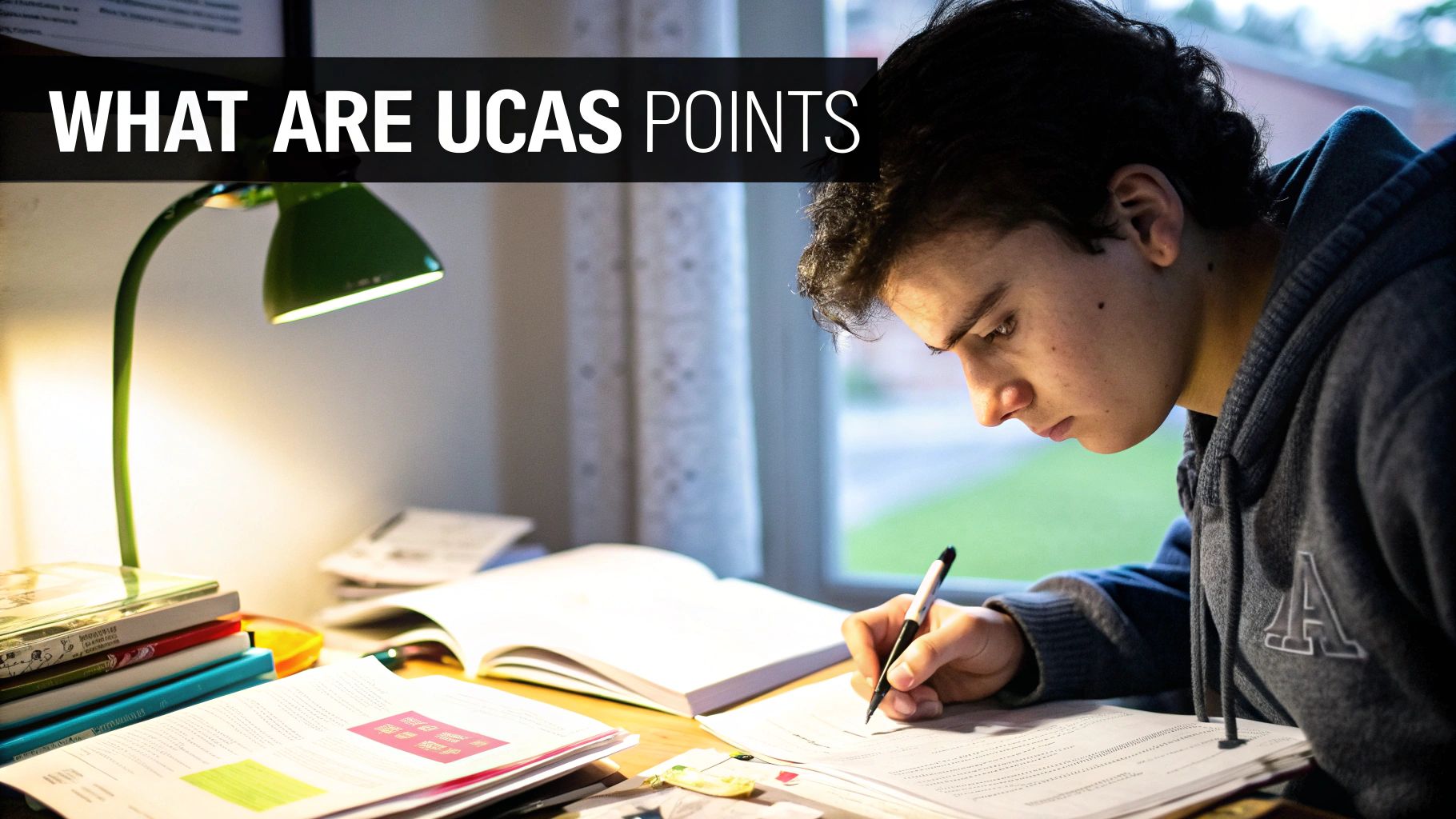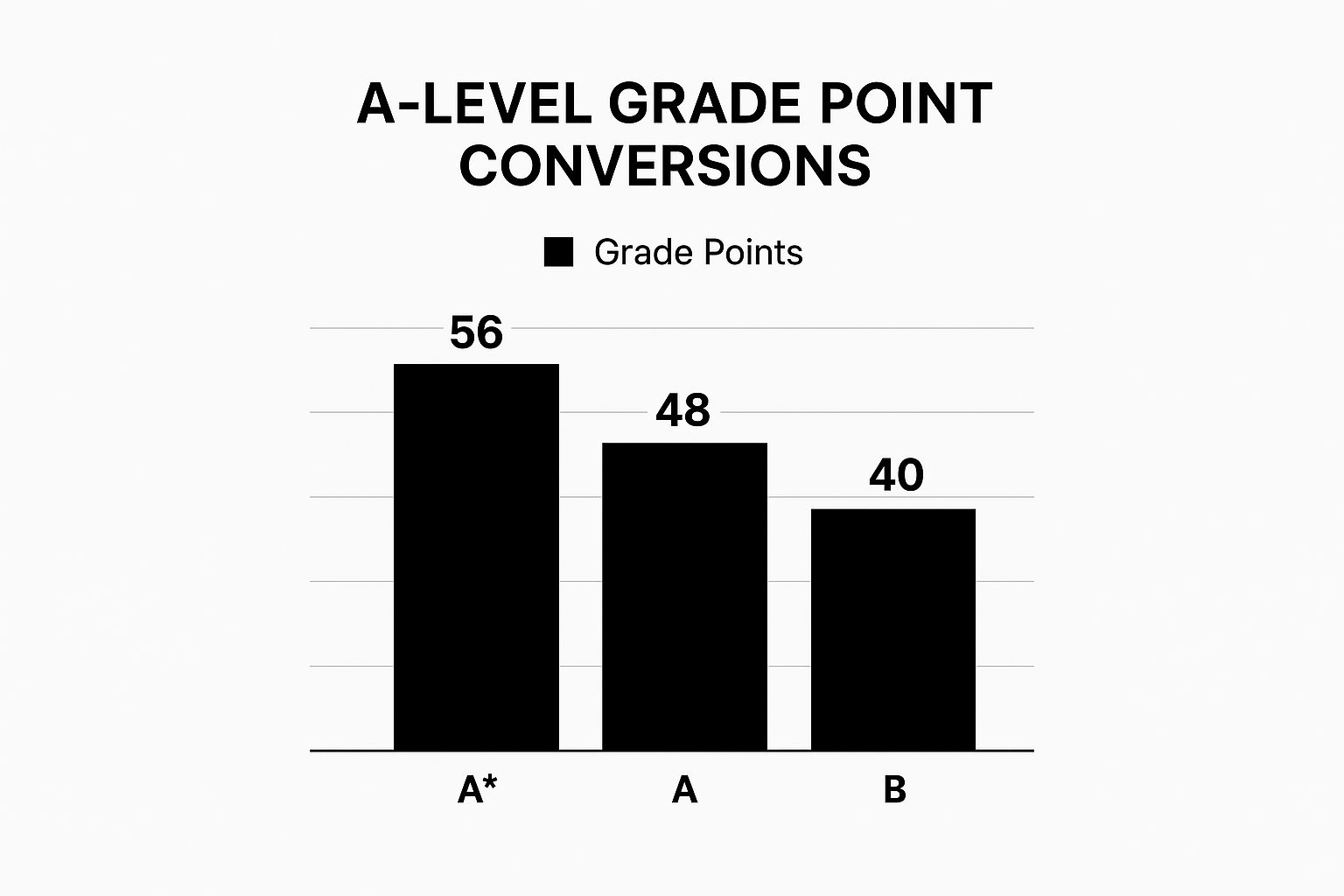UCAS points are a numerical value assigned to post-16 qualifications, like A-Levels or BTECs, to help universities compare applicants from different educational backgrounds. Think of it as a universal currency for grades, turning your child's varied achievements into a single, easy-to-understand score that celebrates their unique path.
What Are UCAS Points and Why Do They Matter?

When you first hear the term ‘UCAS points’, it can feel like learning a new language right at the start of your child's university application journey. It’s easy to feel a surge of anxiety, seeing it as just another number and another hurdle for them to clear.
But taking a different perspective can help calm those worries. The best way to think of UCAS points is like a currency exchange for qualifications. Just as you’d swap pounds for euros, the UCAS Tariff system converts grades from all sorts of qualifications into one standardised value.
This system ensures that your child’s hard work in a BTEC Diploma is recognised on an equal footing with another's achievements in Scottish Highers or A-Levels. At its heart, it’s a system designed to level the playing field, honouring every student's effort.
A Fair System for Every Student
The main goal here is fairness. It gives universities a straightforward way to compare applicants who have taken very different educational paths. It’s not about judging one qualification as "better" than another; it's about recognising the effort and knowledge your child has gained, regardless of how they earned it.
The system is designed to showcase your child's unique strengths, not to act as a barrier. It validates their hard-earned grades by translating them into a language every university admissions tutor understands, giving them the recognition they deserve.
First introduced back in 2001, the UCAS Tariff was created to standardise how UK universities assess the growing variety of post-16 qualifications. While it has been updated over the years to keep up with new courses, its core purpose hasn't changed: to turn diverse achievements into a comparable numerical score.
It’s a method that reinforces the idea that true learning happens in many forms, which is a key aspect of what is inclusion in schools.
How to Calculate Your Child's UCAS Points
Figuring out your child's UCAS points might seem like a complicated puzzle, but it’s actually far more straightforward than you’d think. At its heart, the calculation boils down to two key ingredients: the ‘size’ of their qualification and the ‘grade’ they achieve.
Think of it this way: the ‘size’ is about how much study a qualification involves – a full A-Level, for instance, is a bigger qualification than an AS-Level. The ‘grade’ is simply the result they get, like an A* or a B. UCAS then multiplies these two things together to give a final points total. It’s a simple but effective way to turn your child's different grades and qualifications into a single, comparable number.
Turning Grades into Points
Let's break down how this works in practice. It makes sense that different grades within the same qualification will earn a different number of points. An A* at A-Level, for example, is worth a lot more than a C because it represents a higher level of achievement. It’s a direct reflection of the late nights studying and the dedication they’ve shown.
This image shows you exactly what the top A-Level grades are worth.

As you can see, the jump between grades is pretty significant. This really underlines why encouraging your child to aim for their absolute best can make all the difference in meeting a university’s entry requirements and helping them secure their dream course.
The whole point of the UCAS Tariff is to create a fair "common currency" for all sorts of academic achievements. It’s designed to weigh up both the size and the difficulty of a qualification. For instance, a grade at AS-Level is only valued at roughly 40% of the same grade at A-Level. This makes perfect sense, as it reflects the huge amount of extra work and deeper study needed for the full A-Level, letting universities compare every applicant on a level playing field. For a deeper dive into how this all works, the guide from Crimson Education offers some great insights.
Comparing Different Qualifications
The UCAS Tariff system really comes into its own when you start looking at different types of qualifications. It’s a fantastic way to show your child that all educational paths hold value and that their hard work is recognised, no matter what they study.
To make this clearer, here’s a quick look at how the UCAS Tariff points stack up for some of the most popular qualifications.
UCAS Points for Popular Qualifications
| Grade | A-Level Points | BTEC Extended Diploma Points |
|---|---|---|
| A* | 56 | – |
| A | 48 | – |
| B | 40 | – |
| C | 32 | – |
| D | 24 | – |
| E | 16 | – |
| DDD* | – | 168 |
| DDD | – | 160 |
| DDD | – | 144 |
| DDM | – | 128 |
| DMM | – | 112 |
| MMM | – | 96 |
This table helps translate those letter grades into a numerical score that universities use for their entry requirements.
Let's look at a couple of real-world examples to see how this brings your child's hard work to life:
-
A-Level Student Example: Imagine your daughter, Sarah, is studying three A-Levels and is predicted an A in Physics, an A in Maths, and a B in Chemistry.
- Physics (A) = 48 points
- Maths (A) = 48 points
- Chemistry (B) = 40 points
- Her total comes to 136 UCAS points. This score helps her see exactly where she stands for her dream engineering course.
-
BTEC Student Example: Now, picture another student, Leo, who is passionate about media and is taking a BTEC Level 3 National Extended Diploma. If he achieves the top grades of Distinction*, Distinction*, Distinction* (D*D*D*), that single qualification is worth a massive 168 UCAS points.
What these examples show is that there isn't just one route to a great university offer. Whether your child pursues A-Levels, BTECs, or other qualifications, the Tariff system ensures their achievements are valued fairly.
When Universities Look for Points vs Grades

Working out whether a university wants points or specific grades is a key part of building a smart application strategy with your child. It can feel like a mixed message, but it’s really just two different ways for universities to find the right students. It’s all about matching your child’s unique academic strengths to what a particular course truly values.
Some universities, particularly for very competitive degrees like Medicine or Engineering, will ask for specific grades in certain subjects. An offer of AAB with an A in Chemistry, for example, is a clear signal. It tells you they need applicants with proven, deep knowledge in that specific field.
On the other hand, many universities make offers based on a total points target, like 128 points. This approach offers far more flexibility. It means your child can combine grades from various qualifications to meet the goal, recognising their broader skill set rather than zeroing in on just one or two subjects. This can be a huge relief for a child who excels across a range of interests.
Decoding University Offers
Learning to read between the lines of entry requirements is a huge advantage. Let’s break down how these two types of offers look in the real world:
- A Grade-Specific Offer: "AAB at A-Level, to include an A in Biology." This shows the university is prioritising deep subject knowledge for this specific course. It's a perfect fit for a student who lives and breathes Biology.
- A Points-Based Offer: "120 UCAS Tariff points from a minimum of three A-Levels or equivalent qualifications." This signals flexibility and an appreciation for a wider range of achievements. This is ideal for a well-rounded student who has passions beyond their core subjects.
The key is to see these different offers not as hurdles, but as signposts. They guide you and your child towards the institutions that are the best fit for their specific academic profile and future goals, ensuring they end up somewhere they can truly thrive.
Although UCAS points are meant to be a universal system, it’s surprising to learn that nearly two-thirds of UK universities don’t advertise their main offers using the Tariff. Many still fall back on traditional grade requirements.
This makes it absolutely essential for you and your child to check the specific entry criteria for every single course they’re considering. You can find more details on how universities use these different systems on Oxford Summer Courses.
How to Boost Your Child's UCAS Points Total
When your child puts together their university application, it’s a chance to paint a full picture of who they are. Their potential often shines brightest not just in their core A-Level or BTEC subjects, but in the passions they pursue outside the classroom.
This is where extra qualifications come in. They aren’t just hobbies; they're solid proof of dedication, independent thought, and character. These are precisely the qualities that help an applicant stand out and, crucially, they can add significant numbers to your child’s UCAS points total.
Turning Passions into Points
Many parents are surprised to find out that their child's interests, from music to debating, can earn official recognition and UCAS points. Getting this formal validation is a huge confidence booster, showing them that all their hard work is valued.
Here are a few practical examples of qualifications that add to a UCAS points total:
- Extended Project Qualification (EPQ): An A* in an EPQ is worth a brilliant 28 UCAS points. Universities love the EPQ because it’s a clear sign of strong research skills and self-motivation. It shows your child can take an idea they're passionate about and explore it deeply on their own.
- High-Grade Music Exams: Achieving a Grade 8 Distinction from ABRSM or Trinity College London can add a massive 30 points to their total. This demonstrates years of discipline and dedication.
- LAMDA Awards: A Level 3 Award in Performance also contributes valuable points, showcasing your child’s communication skills and confidence—qualities that are invaluable at university and beyond.
These aren't just bonus points; they tell a story about your child's commitment. They show an admissions tutor that they’re looking at a well-rounded, proactive individual who pursues excellence in everything they do. It’s a powerful way to bring their personality to life.
Combining these achievements with strong grades in their main subjects can make all the difference, especially for courses with flexible points-based offers. It’s also fantastic preparation for the independent study style they'll need at university. For families exploring flexible ways to achieve these goals, understanding the benefits of A-Level distance learning can open up even more pathways to success.
Using UCAS Points to Navigate University Clearing
Results day can be an emotional rollercoaster. If your child misses their firm or insurance offer, it’s completely natural for both of you to feel a wave of disappointment and uncertainty. Your first instinct is to protect and comfort them.
In that stressful moment, however, understanding your child’s final UCAS points total becomes a surprisingly powerful tool. Instead of dwelling on what went wrong, you can immediately pivot to a proactive, practical strategy. Those points are no longer an abstract target; they’re your child's tangible asset, ready to be used to find a fantastic new path.
Turning Uncertainty into Opportunity
Your child's final points total is the key that unlocks new doors. Many universities list their Clearing vacancies with specific UCAS points requirements, making it straightforward to see which courses are a realistic and exciting match.
This simple number transforms a moment of panic into an efficient search for new opportunities. You can sit with your child, look at the options together, and empower them to make a positive choice.
Clearing isn't a backup plan; it's a second chance for your child to find the perfect fit. Their final points total empowers them to take control of their journey and discover a course and university they'll genuinely love. It's a lesson in resilience.
This kind of quick thinking can lead to wonderful, unexpected outcomes. For families navigating this alternative route, a clear grasp of the UCAS Clearing process is what turns a challenging day into a genuine success story for their child.
It’s not uncommon for students to find courses through Clearing that they hadn't even considered before, only to realise they’re a much better fit for their long-term ambitions.
Your Family's UCAS Points Action Plan

Navigating the journey to university can feel like a huge, complicated puzzle. But when you break it down into smaller, manageable pieces, it becomes an exciting project you can tackle together as a family, turning any stress into a shared sense of purpose and support for your child.
Think of this not just as a summary, but as a practical, supportive action plan to guide your next conversations and tasks. By working through these steps, you’ll all feel more prepared, in control, and genuinely ready for what comes next.
The first step is to reframe the UCAS system as just one part of your child's exciting journey. The real goal is to make sure they feel supported and prepared, not overwhelmed by the process.
So, let's bring it all together and map out a clear path forward that puts your child at the centre.
Your UCAS Points Checklist
Here are a few key tasks you can complete together. They'll help you build a crystal-clear picture of your child’s options and the opportunities ahead.
-
Calculate Their Potential Points: Sit down with your child and plug their predicted grades into the official UCAS Tariff calculator. Seeing the numbers makes the whole system less mysterious and turns abstract grades into something tangible and empowering for them.
-
Research Five Universities: Spend some time together exploring the websites of five universities your child is interested in. Look closely at their entry requirements. Do they ask for specific grades like AAB, or do they want a total points score, such as 120 points? This distinction is crucial for finding the best-fit courses for their strengths.
-
List Every Single Qualification: Create a complete list of every single qualification that could contribute points. It's easy to overlook valuable extras like music grades, the Extended Project Qualification (EPQ), or LAMDA awards, so be thorough. This helps your child see all the amazing things they've already achieved.
Frequently Asked Questions About UCAS Points
It's completely natural to have questions when you and your child are navigating the ins and outs of university applications. Getting every detail right can feel like a lot of pressure. Here, we tackle some of the most common worries with clear, straightforward answers to help you feel confident in supporting your child.
Are UCAS Points the Most Important Part of an Application?
While UCAS points are a big deal, they are by no means the whole story. Think of an application as a puzzle; the points are a major piece, but other elements are just as crucial for creating a complete picture of your child.
Universities look at a student’s entire profile. The personal statement, where your child gets to show their genuine passion for a subject, is incredibly important. So is the teacher's reference. These parts of the application show admissions tutors the person behind the grades—their personality, their drive, and their potential.
Can My Child Get an Offer if Predicted Below the Points Needed?
Yes, it’s definitely possible! Universities sometimes make offers to students predicted just below the advertised requirement, especially if other parts of their application are outstanding. A brilliant personal statement that truly captures your child's enthusiasm or a glowing reference can often be the deciding factor.
While it’s always wise to have a range of choices, don't be afraid to support your child in applying for an ambitious option if their overall profile is strong.
It’s a real testament to your child’s character and potential when their passion shines through their application, often convincing admissions teams to look beyond just the numbers. It shows that who they are matters.
Do AS-Levels Still Count Towards a UCAS Points Total?
Absolutely. An AS-Level is typically worth 40% of the points of a full A-Level. For example, if your child gets an A grade at AS-Level, that adds a handy 20 points to their total.
These points are a valuable addition and can be combined with other qualifications to meet a university's offer. They also demonstrate a broader range of study, which is a great way for your child to showcase their intellectual curiosity. For more answers to common queries, you can explore the Queens Online School FAQ page.
At Queens Online School, we understand that every child's educational journey is unique. We provide a supportive, flexible learning environment with expert teachers to help your child achieve their full academic potential and build a standout university application. Discover how our personalised online British curriculum can empower your child by visiting https://queensonlineschool.com/.

